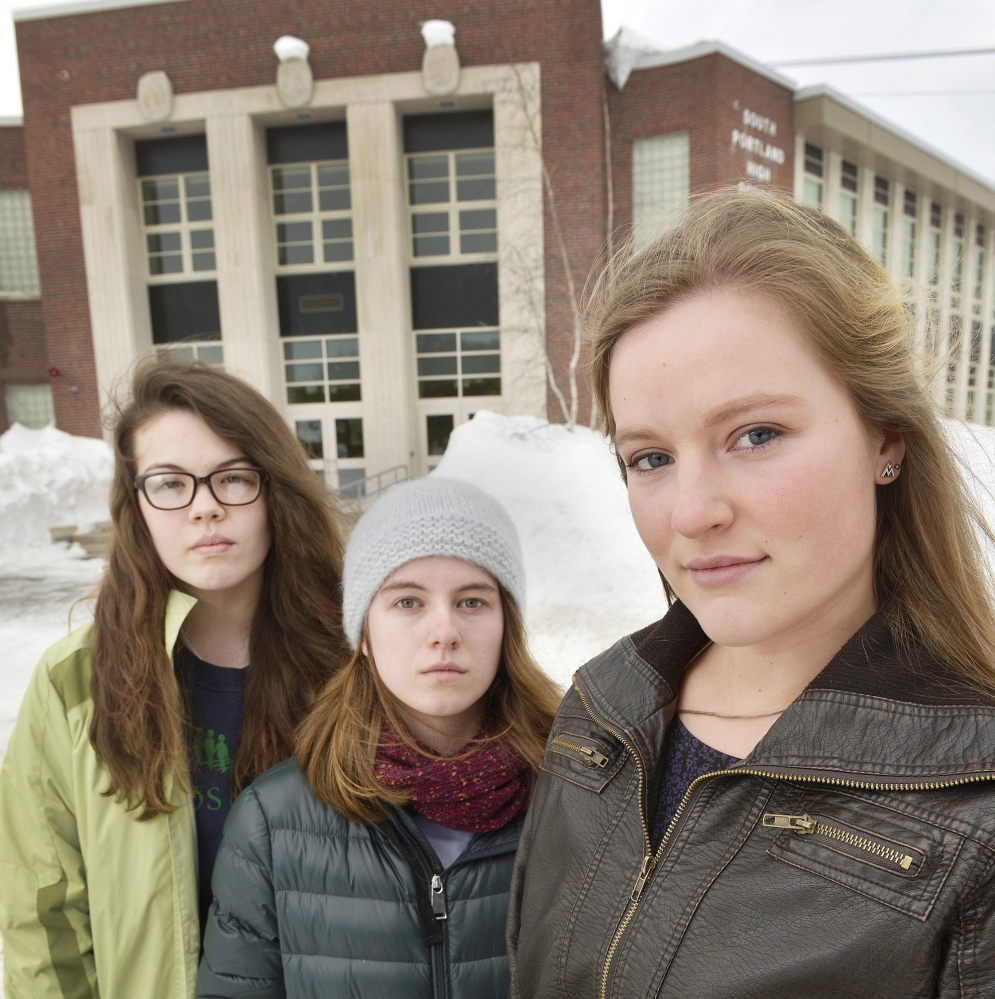SOUTH PORTLAND — Bolstered by support they’ve received in the past week – and despite the hateful reactions of some – three South Portland High School students plan to again seek faculty approval for a controversial new introduction to the Pledge of Allegiance.
Lily SanGiovanni, Gaby Ferrell and Morrigan Turner drew national attention last week when the Portland Press Herald published a story about their efforts to inform fellow students and faculty members that saying the pledge is optional under the law.
Their story has been viewed by 82,000 readers on pressherald.com, picked up by other local media outlets, shared through various other websites, blogs and social media, and commented on by thousands of people across the nation.
“It’s been crazy,” Turner said Wednesday. “We knew it was a sensitive topic. We knew there would be a reaction. But it has been amazing.”
SanGiovanni, who is senior class president, sparked some outrage in the community in January when she added “if you’d like to” to her daily invitation to say the pledge. Initially, the negative reaction led her to stop saying the four words, but now she and her friends are scheduled to go before faculty leaders on March 19 to try to persuade them to reverse their earlier opposition.
The students see the response to their story as largely positive, with kudos flowing from family members, friends, teachers, community leaders and complete strangers, including from students across Maine. Feedback has come in the form of emails, tweets, Facebook comments, editorials and several personal letters sent to the high school. One letter came from a retired educator who lives in Portland.
“I salute your efforts to respect each school community member’s right to choose whether to join in the pledge,” SanGiovanni read. “Aren’t our schools supposed to be creating critical thinkers rather than people who will blindly follow without discernment?”
Some other responses have been hateful and ignorant, including threatening online comments questioning the girls’ patriotism and suggesting they should leave the country of their birth.
“One student at the high school yelled at me, ‘Thanks for hating America,’ and then he ran away,” Ferrell said.
The girls – all three are top seniors heading to competitive colleges – decided to alter the pledge invitation after the faculty leadership team rejected an alternative proposal. That proposal would have replaced the pledge with a moment of silence, during which students would be allowed to say the pledge in their classrooms.
Each girl has concerns about saying the pledge, from not being religious, to not feeling old enough to pledge allegiance, to not believing that “liberty and justice” are available to all Americans. They wanted to make sure other students understood that teachers couldn’t force them to stand and recite the pledge, which they say has happened in the past.
“At this time,” SanGiovanni said over the intercom, “would you please rise and join me for the Pledge of Allegiance if you’d like to.”
‘IF YOU’D LIKE TO’
Students have protested saying the pledge in school for decades. California school officials apologized last fall after a student who was an atheist reported that a teacher compelled him to say the pledge. The Massachusetts Supreme Court ruled last spring that reciting the words “under God” in the pledge doesn’t discriminate against non-religious students who hear it.
The pledge itself has a complicated past. It was written in 1892 by Francis Bellamy, a Christian socialist minister and author known for racist, anti-immigrant views. Congress formally adopted it as the pledge in 1942 and added the words “under God” in 1954.
Under a Maine law passed in 2011, public schools must allow every student “the opportunity to recite the Pledge of Allegiance at some point during a school day in which students are required to attend,” but they cannot require students to say the pledge.
South Portland High hadn’t been saying the pledge each morning, but resumed the practice on Sept. 12, 2001, the day after the terrorist attacks on the World Trade Center and the Pentagon, SanGiovanni said.
Her addition of “if you’d like to” inflamed simmering opposition from some staff members and triggered an emotional, anti-immigrant backlash in the community. A Facebook post by a local businessman drew a flurry of bigoted, anti-welfare, pro-veteran comments from people who assumed that the students behind the change were immigrants.
Soon, the principal asked SanGiovanni to stop saying “if you’d like to” or pass the privilege of leading the pledge on to another student. She stopped, but the girls were left searching for a way to carry their cause forward.
NO REGRETS
Fueled by what they see as a largely positive response to their story, the girls now hope to reach an accord with faculty leaders. They plan to demonstrate more clearly how students may have been harmed by being compelled to say the pledge in the past. They also plan to present examples of student and community support.
They have plenty of examples to choose from. Some teachers sent emails praising them for their activism. Some classmates said they stopped saying the pledge once they realized it was optional. Other students, who previously mumbled the pledge, started saying it with gusto because they finally understood what it means.
“That’s great to hear,” Turner said. “We wanted people to think about what they’re doing every day because for the most part, they haven’t been.”
The girls haven’t worked out the exact language of the proposal they plan to make on March 19. Whatever the outcome, they say the experience so far has been worth it.
“It’s been an eye-opening journey,” SanGiovanni said. “I don’t regret any of it. A conversation has been sparked. I’m looking forward to seeing if more students follow our lead.”
Send questions/comments to the editors.




Comments are no longer available on this story